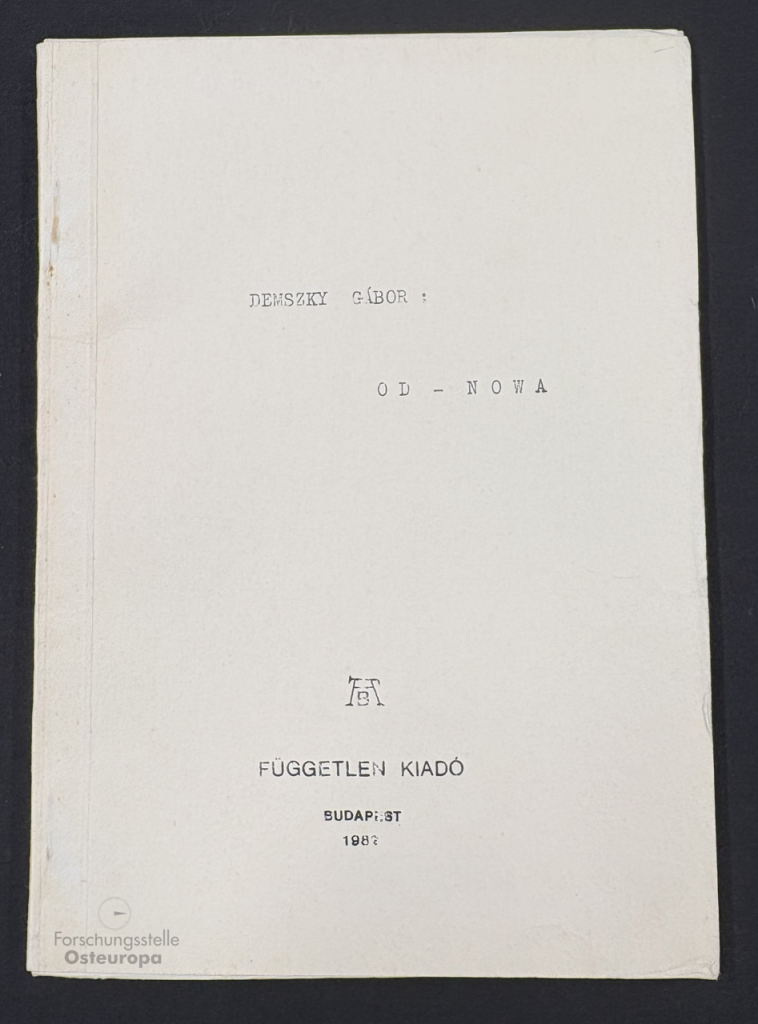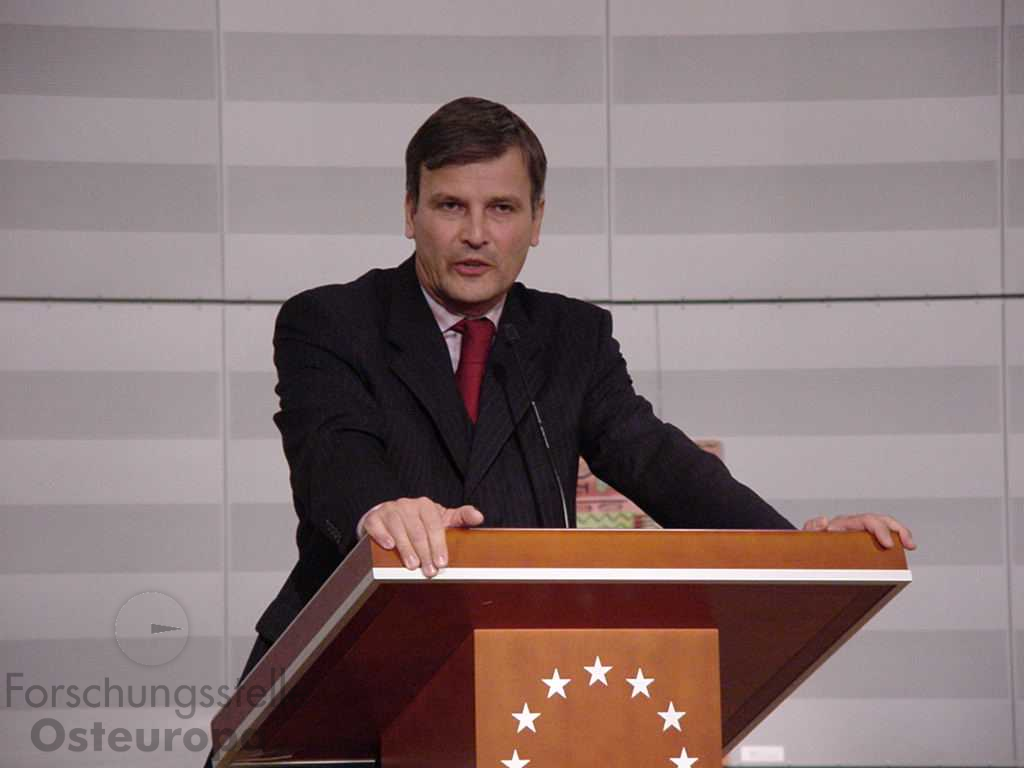Odesa-Tage 2025
Eröffnung globale°-Festival / Kolloquiumsvortrag
19:00, Rathaus Bremen
David Safier (Bremen)
„Die Liebe sucht ein Zimmer“
Anmeldung bis 20.10
globale°-Festival / Kolloquiumsvortrag
18 Uhr (s.t.), Europapunkt, Am Markt 20
Oxana Matiychuk (Tscherniwzi)
Literatur im/vom Krieg. Ein Bericht aus Tscherniwzi
Conference: Coming to the Surface or Going Underground? Art Practices, Actors, and Lifestyles in the Soviet Union of the 1950s-1970s
Research Centre for East European Studies (FSO)
Registration until 07.11.2025
Wissenswertes
Odnowa: Dissident „Renewal” in the 1980s
An Important Document of Unofficial Polish–Hungarian Relations, Transnational Knowledge Transfer and Solidarity

The booklet Od-nowa, Gábor Demszky, 1982. Archive of the Research Centre for East European Studies. Photo: Muriel Nägler.
In 1982 the Hungarian AB Független Kiadó (AB Independent Publishing House) published a 31-page booklet written by the Hungarian dissident intellectual Gábor Demszky (*1952). The title of the uncensored publication – Od-nowa – had a double meaning. It referred both to the socio-political processes taking place in Poland, i.e. the “renewal”, as well as to the name of the most important Polish samizdat publisher, NOWA. But how did this Polish expression end up on the cover of a Hungarian samizdat publication?
Demszky, a sociologist, became involved in the activities of the emerging Hungarian democratic opposition in the late 1970s. He took part in the Napló (Diary) initiative, which was essentially a typewritten communication network between dissidents. Demszky himself contributed texts and translations to Napló. These included an interview with Konrad Bieliński, an activist of the Polish NOWA Publishing House, published in the Austrian newspaper Forum. In it Bieliński discussed how, despite facing police harassment since its inception in 1977, NOWA had succeeded in printing approximately 100,000 copies of hundred different publications, using the most basic methods.
Impressed by the interview, Demszky decided to start a similar independent publishing house in communist Hungary. To this end, Demszky travelled incognito to Poland in May 1981. He spent a month in the country, where he made contact with Polish oppositionists, studied the activity of the Solidarność movement, and sought to understand the accomplishments of the Polish second public sphere. In other words, he learned to conspire and to print with rudimentary means.

Gábor Demszky at the opening of the Samizdat exhibition in Brussels, at the European Parliament, 2002.Archive of the Research Centre for East European Studies. Photographer unknown
On his return home, on 6 June, 1981, he gave a lecture at the private home of another dissident, Ferenc Kőszeg, as part of the underground educational institution, the Flying University. Here, he reported on his experiences and observations from his “study visit”. Demszky was convinced that the most important aspect of Solidarność was “the creation of an independent public sphere”. He spoke of the uncensored publishers, particularly NOWA, which had broken the Communist Party’s monopoly over the mass media.
After the lecture, Demszky was fired from his job which gave him a new impetus to choose the dissident lifestyle. A few months later, the AB Independent Publishing House began operating, and in 1982 it published a transcript of Demszky’s lecture based on an audio recording made at the Flying University.
The tiny booklet, entitled Od-nowa, is thus a document of the early period of Polish–Hungarian opposition relations. It is a product of the knowledge transfer through which opposition programs, strategies and techniques were disseminated in the Soviet bloc. It is also a testimony to risk-taking and civic courage, and a gesture of solidarity with Polish oppositionists.
The booklet was published in a very small number of copies, currently only available in Hungary at the National Széchényi Library, and rarely at auction. A precious copy of this publication was donated to the Research Centre for East European Studies (FSO) by Demszky himself. In addition, as the Mayor of Budapest, he opened the exhibition “Samizdat: Alternative Culture in Central and Eastern Europe from the 1960s to the 1980s” curated by the FSO in Berlin in 2000 and attended the opening of the exhibition in Brussels in 2002.
Gábor Danyi
Danyi, Gábor: Inspired to follow Poland’s example. Hungarian democratic opposition in the early 1980s, in: Polish History (2020), https://polishhistory.pl/inspired-to-follow-polands-example/ [17.06.2025].
Mitrovits, Miklós: Tiltott kapcsolat. A magyar–lengyel ellenzéki együttműködés 1976–1989, Budapest 2020.
Gábor Danyi (PhD) is a Hungarian literary scholar, historian and translator. He is the author of: Az írógép és az utazótáska. Szamizdat irodalom Magyarországon 1956–1989 [The Typewriter and the Travelling Bag. Samizdat Literature in Hungary 1956–1989], Pécs 2023.
Länder-Analysen
» Länder-Analysen
» Eastern Europe - Analytical Digests
Discuss Data
Archiving, sharing and discussing research data on Eastern Europe, South Caucasus and Central AsiaOnline-Dossiers zu
» Erdgashandel
» Hier spricht das Archiv
» Russian street art against war
» Dissens in der UdSSR
» Duma-Debatten
» 20 Jahre Putin
» Protest in Russland
» Annexion der Krim
» sowjetischem Truppenabzug aus der DDR
» Mauerfall 1989

